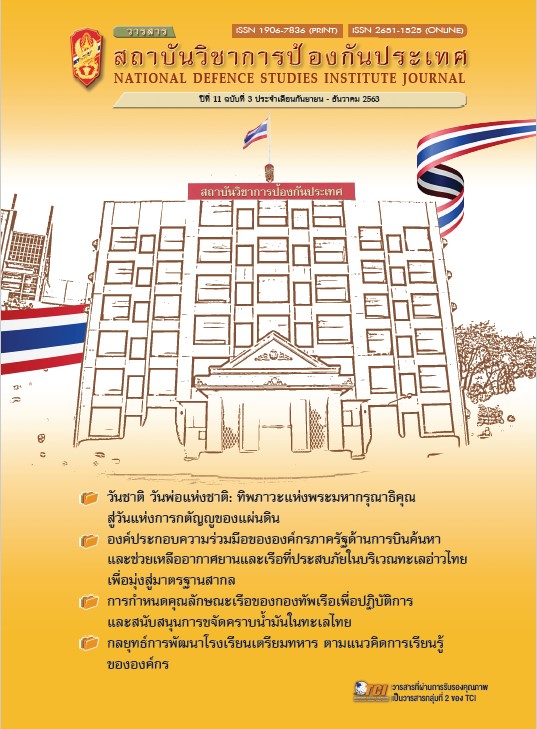The ความต้องการทำงานหลังเกษียณอายุราชการของข้าราชการทหารบก
Main Article Content
บทคัดย่อ
ในการวิจัยนี้ผู้วิจัยมีวัตถุประสงค์ของการศึกษา 2 ข้อที่สำคัญ คือ ข้อที่ 1 ประกอบด้วย 3 ข้อย่อย คือ 1.1 ศึกษาเหตุผลที่ต้องการทำงานหลังเกษียณอายุราชการ 1.2 ลักษณะงานที่ต้องการทำหลังเกษียณอายุราชการ 1.3 ปัญหาอุปสรรคในการหางานทำหลังเกษียณอายุราชการของข้าราชการทหารบก สำหรับวัตถุประสงค์ของการศึกษาข้อที่ 2 คือ เพื่อศึกษาปัจจัยที่มีอิทธิพลทั้งทางตรงและทางอ้อมของ ความมั่นคงทางการเงิน ภาระดูแลครอบครัว ทัศนคติส่วนบุคคล ค่านิยมทางสังคมและสุขภาพต่อการตัดสินใจที่จะทำงานหลังเกษียณอายุราชการของข้าราชการทหารบก โดยใช้เทคนิคการวิเคราะห์ “ตัวแบบสมการโครงสร้าง” ประมวลผลด้วยโปรแกรม AMOS โดยการเก็บรวบรวมข้อมูลกลุ่มตัวอย่าง ประกอบด้วย นายทหารชั้นสัญญาบัตร 21 คน และนายทหารชั้นประทวน 194 คน รวมทั้งสิ้นจำนวน 215 คน
ผลการวิจัยพบว่า เหตุผลที่ต้องการทำงานหลังเกษียณอายุราชการส่วนใหญ่ให้เหตุผลว่าต้องการ “ความมั่นคงทางการเงิน” คือต้องการหารายได้เพิ่มเติมเพื่อเลี้ยงดูครอบครัว อยู่ที่ร้อยละ 54.42 รองลงมาคือ ปัจจัยด้านสุขภาพ คือ คิดว่าสุขภาพยังแข็งแรง ต้องการใช้เวลาว่างให้เกิดประโยชน์ คิดเป็นร้อยละ 37.21 และ 18.60 ตามลำดับ สำหรับเหตุผลที่ไม่ต้องการทำงานหลังเกษียณอายุราชการ ได้แก่ ต้องการพักผ่อน ตามมาด้วย สุขภาพไม่ดี และไม่มีภาระดูแลบุคคลในครอบครัว และมีรายได้เพียงพอในการดูแลตนเอง และครอบครัว ตามลำดับ สำหรับลักษณะงานที่สนใจทำ จากการวิจัย พบว่า สนใจอาชีพทำไร่ทำสวน ที่ร้อยละ 38.60 รองลงมาคือ อาชีพค้าขายที่ร้อยละ 18.60 และงานที่ปรึกษา/บริหาร ที่ร้อยละ 15.35 ตามลำดับ สำหรับงานอาชีพรับจ้างทั่วไปและอาชีพรับจ้างเฉพาะ เช่น ขับรถยนต์รับจ้างส่วนบุคคล (Taxi) จักรยานยนต์รับจ้าง มีความต้องการในระดับที่เท่ากัน คือ ประมาณร้อยละ 13 กำลังพลที่เกษียณอายุราชการแบ่งเป็น 2 กลุ่ม กลุ่มแรกเป็นนายทหารชั้นสัญญาบัตร จะเลือกอาชีพที่ใช้ความคิด ได้แก่ อาชีพที่ปรึกษาบริหารและสอนหนังสือ ส่วนกลุ่มที่สองเป็นทหารชั้นประทวนจะเลือกอาชีพที่ใช้ร่างกาย ได้แก่ อาชีพรับจ้าง ค้าขาย เป็นหลัก สำหรับอาชีพทำไร่ทำสวนเป็นอาชีพที่กำลังพลทั้ง 2 กลุ่ม ที่ได้มีการวางแผนไว้ล่วงหน้า เช่น มีการลงทุนซื้อที่ดิน และได้ดำเนินการไว้แล้วก่อนเกษียณอายุราชการ สำหรับปัญหาและอุปสรรคในการทำงานหลังเกษียณอายุราชการ พบว่า ส่วนใหญ่ ร้อยละ 31.63 ตอบว่า สมาชิกในครอบครัวไม่สนับสนุน รองลงมาคือร้อยละ 29.77 ตอบว่า สุขภาพไม่ดี และร้อยละ 17.21 ตอบว่า ไม่คิดว่าจะมีหน่วยงานใดจ้าง ร้อยละ 13.49 ตอบว่า ไม่สามารถปรับตัวเข้ากับเทคโนโลยีใหม่ ๆ ได้ และร้อยละ 12.56 ตอบว่า เวลาทำงานไม่ยืดหยุ่น ร้อยละ 9.77 ตอบว่า ขาดความรู้ความสามารถ และร้อยละ 6.98 ตอบว่า ขาดปัจจัยทุน ตามลำดับ
Article Details
บทความ ภาพ ตาราง กราฟ ข้อเขียน หรือความคิดเห็นในวารสารฉบับนี้เป็นของผู้เขียนไม่ผูกพันกับสถาบันวิชาการป้องกันประเทศ และทางวิชาการแต่อย่างใด
เอกสารอ้างอิง
กระทรวงการพัฒนาสังคมและความมั่นคงของมนุษย์, กรมกิจการผู้สูงอายุ. (2562). ผู้สูงอายุไทยกับสังคมสูงวัย. สืบค้นเมื่อ 2 กรกฎาคม 2562, จาก www.dop.go.th
เพ็ญ คำแผง, พ.อ. (พิเศษ). (7 สิงหาคม 2562). สัมภาษณ์.
วิสุทธิ์ กังวานตระกูล. (2554). การคำนวณขนาดตัวอย่าง (sample size calculation). ขอนแก่น: โรงพิมพ์มหาวิทยาลัยขอนแก่น.
สุชาติ คุ้มวัน. จ.อ. (2559). การศึกษาความต้องการทำงานหลังเกษียณอายุราชการของข้าราชการทหารอากาศ (วิทยานิพนธ์เศรษฐศาสตรมหาบัณฑิต). มหาวิทยาลัยรามคำแหง. กรุงเทพฯ.
สุภาพร ยั่งยืน และ ปริณภา จิตราภัณฑ์. (2561). การตัดสินใจทำงานของข้าราชการพลเรือนหลังเกษียณอายุราชการ.กรุงเทพฯ: มหาวิทยาลัยรามคำแหง.


